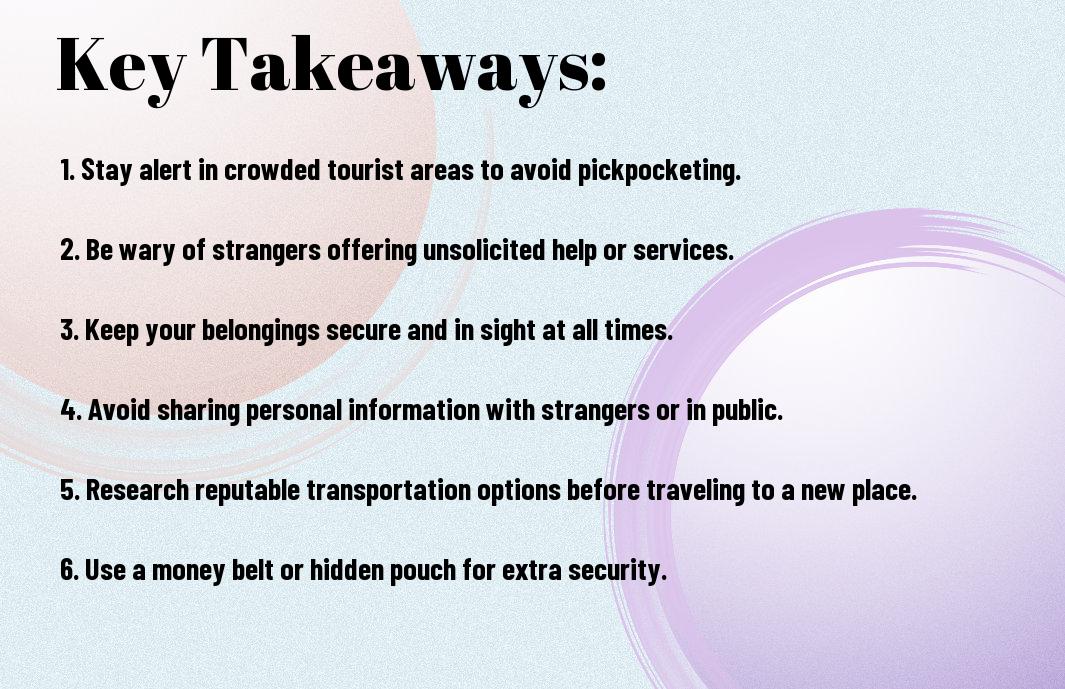Table of Contents
Are you looking forward to your next trip, but concerned about falling victim to common travel scams and theft during your journey? It’s important to stay informed and aware of your surroundings to protect yourself. In this blog post, we’ll discuss key strategies to avoid becoming a target and protect your belongings while traveling. Whether you’re navigating a bustling city or relaxing on a beach, these tips will help you stay safe and enjoy your trip without worrying about falling victim to scams or theft.
Key Takeaways:
- Stay vigilant: Always be aware of your surroundings and trust your instincts when it comes to suspicious behavior or offers.
- Research local scams: Before traveling, research common scams in the area you will be visiting so you can be prepared to avoid them.
- Secure your belongings: Use theft-proof bags, hotel safes, and keep an eye on your belongings at all times to prevent theft.
- Avoid sharing personal information: Be cautious of sharing personal information or financial details with strangers, especially in unfamiliar places.
- Use trusted transportation and accommodation: Stick to reputable transportation services and accommodations to minimize the risk of falling victim to scams.

Types of Common Travel Scams
Some common travel scams you should be aware of include:
| Scam Type | Description |
|---|---|
| Fake Accommodation Listings | Scammers list bogus properties online to trick unsuspecting travelers into paying for non-existent lodging. |
| Taxi Scams and Overcharges | Dishonest taxi drivers may take advantage of tourists by overcharging or taking longer routes to inflate fares. |
| Street Scams and Distraction Thefts | Thieves may use various tactics such as distraction or staged accidents to steal your belongings. |
| Currency Exchange Fraud | Unscrupulous currency exchange operators may engage in deceptive practices to cheat you out of money. |
Fake Accommodation Listings
When booking accommodation, be cautious of fake listings. Scammers may create phony rental properties or hotels to take your money without providing any actual lodging. Always verify the legitimacy of the accommodation through reputable websites and customer reviews before making any reservations.
Taxi Scams and Overcharges
Some taxi drivers may try to rip you off by taking longer routes or overcharging you for the fare. Always ensure that the taxi meter is running and negotiate the fare upfront if possible. Research the approximate fare for your destination to avoid getting overcharged. Use reputable taxi companies whenever possible.
Street Scams and Distraction Thefts
Be wary of street scams and distraction thefts in crowded tourist areas. Thieves may use various tactics, such as asking for directions or causing a commotion, to divert your attention while an accomplice steals your belongings. Stay alert and keep your valuables secure, preferably in a money belt or a secure bag. Avoid exposing large sums of money or valuable items in public.
Currency Exchange Fraud
When exchanging currency, be cautious of fraudulent operators who might use dishonest tactics to shortchange you. Always use legitimate exchange services, such as banks or authorized currency exchange bureaus. Calculate the exchange rate beforehand and count your money carefully. Assume that any unsolicited offers for currency exchange are too good to be true and could be a scam.
Protecting Your Belongings
Now that you are aware of the common travel scams and thefts, it’s important to take necessary precautions to protect your belongings while traveling. Here are some essential tips to ensure the safety of your possessions during your trip.
Secure Your Luggage and Valuables
When traveling, always keep your luggage and valuables secure. Use TSA-approved locks to prevent unauthorized access to your luggage. Consider investing in a secure luggage strap or a protective cover for your suitcase to deter tampering. Additionally, never leave your belongings unattended, especially in crowded tourist areas. It’s crucial to remain vigilant and keep a close eye on your bags at all times.
Digital Security Measures for Travelers
In today’s digital age, it’s important to safeguard your electronic devices and personal information while traveling. Be cautious when using public Wi-Fi, as it can be a hotspot for hackers to access your sensitive data. Consider using a virtual private network (VPN) to encrypt your internet connection and protect your online activities. Furthermore, enable multi-factor authentication on your devices and regularly update your passwords to prevent unauthorized access to your accounts. Remember to back up your data before traveling and avoid sharing your travel plans on social media to minimize the risk of burglary.
By following these tips, you can significantly reduce the risk of theft and scams while traveling. Always stay vigilant and prioritize the safety of your belongings to ensure a smooth and enjoyable travel experience.
Safe Financial Practices Abroad
Lastly, let’s talk about safe financial practices while traveling abroad. It’s important to take steps to protect your money and financial information from theft and scams while you’re away from home.
Avoiding ATM and Credit Card Skimming
One of the most common scams targeting travelers is ATM and credit card skimming. Criminals install skimming devices on ATMs or other card readers to capture your card information as you use it. To avoid falling victim to this scam, always inspect the ATM or card reader for any suspicious devices or loose parts. Additionally, cover the keypad with your hand when entering your PIN to prevent hidden cameras from recording it. If you can, use ATMs located inside banks or other secure locations rather than standalone machines.
Best Practices for Carrying Cash
When it comes to carrying cash while traveling, it’s important to use caution and common sense. Avoid carrying large amounts of cash and only take out what you think you’ll need for the day. Consider using a money belt or hidden pouch to keep your cash concealed and close to your body, rather than in a wallet or purse that can easily be snatched. If you need to carry a significant amount of cash, consider splitting it up and storing it in different places on your person, so that if you are robbed, you won’t lose everything.

Dealing With Thefts and Scams
After experiencing a theft or falling victim to a scam during your travels, it’s important to take action promptly and effectively. Whether you’ve had your belongings stolen or been tricked into a fraudulent scheme, knowing how to deal with such situations can minimize the impact and help you recover from the incident.
Immediate Steps After Being Scammed
If you find yourself in the unfortunate situation of being scammed while traveling, the first thing you should do is to stay calm and assess the situation. Take a moment to gather your thoughts and ensure your safety and well-being. Once you’ve composed yourself, immediately report the incident to the local authorities or the nearest embassy or consulate. Document any relevant information, such as the location, time, and details of the scam, to assist the authorities in their investigation. Additionally, contact your bank or credit card company to report the incident and limit any potential financial losses. It’s also wise to inform your accommodation provider or tour operator about the incident, as they may be able to offer assistance or advice.
Reporting to Authorities and Seeking Help
After experiencing a theft or falling victim to a scam, reporting the incident to the local authorities is crucial to increasing the chances of recovering your belongings and preventing the perpetrators from targeting others. Provide the authorities with as much detail as possible, including descriptions of the individuals involved or any identifiable markers. Additionally, seek assistance from your embassy or consulate, as they can provide valuable guidance and support during such stressful times. Your embassy or consulate can also help you navigate any legal or administrative procedures that may arise as a result of the incident.

Conclusion: How to avoid common travel scams and theft
To wrap up, it’s important to stay vigilant and cautious while traveling to avoid falling victim to common scams and theft. By keeping your valuables secure, being aware of your surroundings, and avoiding potential scams such as fake taxi drivers or overly friendly strangers, you can significantly lower your risk of becoming a target. Always trust your instincts and do your research before traveling to unfamiliar places. By taking these precautions, you can enjoy your travels with peace of mind and avoid the stress and inconvenience of falling victim to scams or theft.
FAQ
Q: What are common travel scams and thefts to watch out for?
A: Common travel scams and thefts include pickpocketing, fake police officers, distraction techniques, ATM skimming, overcharging for goods and services, and taxi scams. It’s important to be aware of these tactics and take precautions to avoid falling victim to them.
Q: How can I avoid falling victim to travel scams and thefts?
A: To avoid falling victim to travel scams and thefts, it’s important to stay vigilant and aware of your surroundings. Keep your valuables secure and out of sight, avoid displaying large sums of money, be cautious of strangers offering unsolicited help, and use ATMs in well-lit, secure locations. Additionally, research common scams in the area you are visiting and be cautious of any suspicious behavior.
Q: What should I do if I suspect I am being targeted by a travel scam or theft?
A: If you suspect you are being targeted by a travel scam or theft, trust your instincts and remove yourself from the situation as quickly and safely as possible. If you have been the victim of theft, report the incident to local authorities and your embassy or consulate. It’s also important to cancel any compromised credit cards and contact your bank to protect yourself from further financial loss. Remember to document any incidents and report them to the relevant authorities for follow-up.

